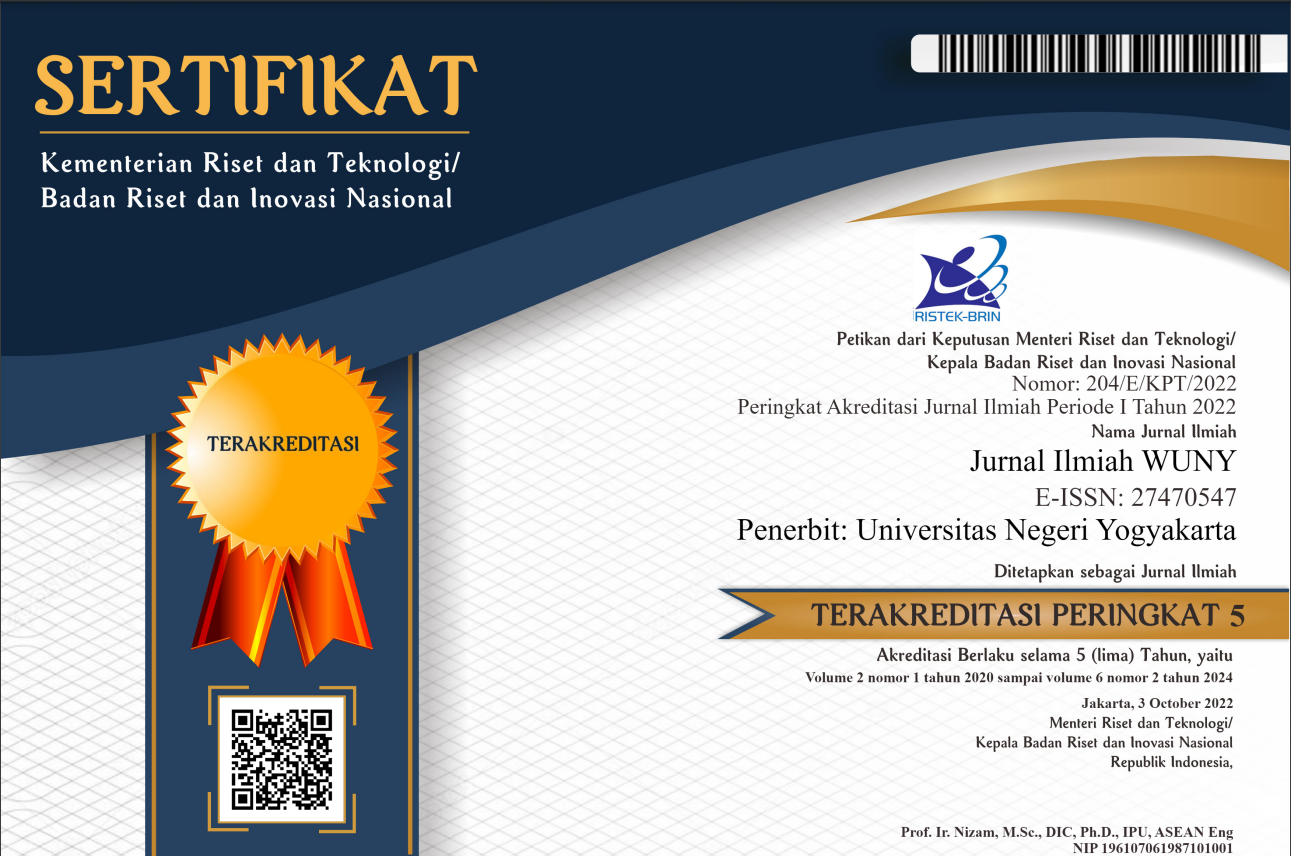Community-based Islamic education: Democratizing learning through local wisdom
Ahmad Muzakkil Anam, UIN Maulana Malik Ibrahim Malang, Indonesia
Danang Ade Agustinova, SMP Negeri 8 Yogyakarta, Indonesia
Diana Prasastiawati, Universitas Sebelas Maret, Indonesia
Fakhur Rohman Nur Awalin, UIN Sayyid Ali Rahmatullah Tulungagung
Norazlan Hadi Yaacob, Universiti Pendidikan Sultan Idris, Malaysia
Abstract
Keywords
Full Text:
PDFReferences
Aman, Aman, and Balraj Singh. 2022. “Comparative Study Of Character Education Model In Uny Indonesia And Punjabi University India.” Jurnal Ilmiah WUNY 4(2):161–84. doi: 10.21831/jwuny.v4i2.54516.
Apple, Michael W. 2007. Democratic Schools: Lessons in Powerful Education. Assn for Supervision & Curriculum.
Ar-Rifa’i, Muhammad Nasib. 1999. Kemudahan dari Allah: Ringkasan Tafsir Ibnu Katsir. Gema Insani.
Aslan, Aslan, Hifza Hifza, and Muhammad Suhardi. 2020. “Dinamika Pendidikan Islam Di Thailand Pada Abad 19-20.” Nazhruna: Jurnal Pendidikan Islam 3:38–54. doi: 10.31538/nzh.v3i1.476.
Azra, Azyumardi. 1999a. Esei-esei Intelektual Muslim dan Pendidikan Islam. Logos Wacana Ilmu.
Azra, Azyumardi. 1999b. Pendidikan Islam: Tradisi dan Modernisasi Menuju Milenium Baru. Logos Wacana Ilmu.
Bashir, Aamir. n.d. “The Educational Philosophy and Practice of Syed Muhammad Naquib al-Attas: An Exposition of the Original Concept of Islamization of Knowledge.”
Bray, Mark. 1996. Decentralization of Education: Community Financing. World Bank Publications.
Castells, Manuel. 2011. The Rise of the Network Society. John Wiley & Sons.
Dei, George J. Sefa. 2000. “Rethinking The Role of Indigenous Knowledges in The Academy.” International Journal of Inclusive Education 4(2):111–32. doi: 10.1080/136031100284849.
Dewey, John. 2009. Democracy and Education. GRIN Verlag.
Freire, Paulo. 1970. Pedagogy of the Oppressed. Texas: Herder and Herder.
Halstead, Mark. 2004. “An Islamic Concept of Education.” Comparative Education 40(4):517–29. doi: 10.1080/0305006042000284510.
Hashim, Rosnani. 1998. “Educational Dualism in Malaysia: Implications for Theory and Practice.” The Journal of Asian Studies 57. doi: 10.2307/2658815.
Hefner, Robert W., and Muhammad Qasim Zaman. 2007. Schooling Islam: The Culture and Politics of Modern Muslim Education. Princeton University Press.
Hudaya, Hairul. 2017. “Metode Syarh Hadis Dalam Kitab Fath Al-Bary.” Jurnal Ilmiah Ilmu Ushuluddin 16(2):117–38. doi: 10.18592/jiu.v16i2.1734.
Lukens-Bull, Ronald. 2001. “Two Sides of the Same Coin: Modernity and Tradition in Islamic Education in Indonesia.” Anthropology & Education Quarterly 32:350–72. doi: 10.1525/aeq.2001.32.3.350.
Makdisi, George. 1981. The Rise of Colleges: Institutions of Learning in Islam and the West. Edinburgh University Press.
Mcginn, Noel, Thomas Welsh, and UNESCO-IIEP. 1999. “Decentralization of Eeducation: Why, When, What and How?” Http://Lst-Iiep.Iiep-Unesco.Org/Cgi-Bin/Wwwi32.Exe/[In=epidoc1.in]/?T2000=011103/(100).
MR, Moh Irsyad Fahmi, and Anik Widiastuti. 2024. Pendidikan Sociopreneur Komunitas Muslim: Integrasi Nilai Islam Dan Kewirausahaan Sosial. Yogyakarta: UNY Press.
Nath, Samir R. 2002. “The Transition from Non-Formal to Formal Education: The Case of BRAC, Bangladesh.” International Review of Education / Internationale Zeitschrift Für Erziehungswissenschaft / Revue Internationale de l’Education 48(6):517–24.
Rahim, Abdan. 2019. “Peran Wakaf Dalam Pengembangan Pendidikan Islam.” Al Qalam: Jurnal Ilmiah Keagamaan dan Kemasyarakatan 13(1):89–102. doi: 10.35931/aq.v0i0.131.
Rahman, Fazlur. 1982. Islam and Modernity: Transformation of an Intellectual Tradition. University of Chicago Press.
Ramadani, Rifkyanoor. 2022. “Proses Kreatif Transformasi Wadian Dadas Pada Ritual Penyembuhan Dayak Ma’anyan Ke Bentuk Karya Tari Hyang Dadas.” Jurnal Ilmiah WUNY 4(1):93–110. doi: 10.21831/jwuny.v4i1.46466.
Resources, Research Foundation for Science, Technology, and Natural. 2000. Indigenous Knowledges in Global Contexts: Multiple Readings of Our World. University of Toronto Press.
Rosenthal, Franz. 2007. Knowledge Triumphant: The Concept of Knowledge in Medieval Islam. BRILL.
Shalaby, Ahmad. 2021. Sejarah Pendidikan Islam. Pustaka Nasional Pte Ltd.
Spring, Joel. 2014. Globalization of Education: An Introduction. Routledge.
Tan, Charlene. 2011. Islamic Education and Indoctrination: The Case in Indonesia.
Tibawi, A. L. 1962. “Origin and Character of Al-Madrasah.” Bulletin of the School of Oriental and African Studies 25(2):225–38. doi: 10.1017/S0041977X00063709.
Tilaar, H. A. R. 2003. Kekuasaan Dan Pendidikan: Suatu Tinjauan dari Perspektif Studi Kultural. IndonesiaTera.
Waghid, Yusef. 2013. “African Philosophy of Education Reconsidered: On Being Human.” African Philosophy of Education Reconsidered: On Being Human 1–145. doi: 10.4324/9780203538166.
Widiastuti, Anik, and Moh Irsyad Fahmi MR. 2024. “Meningkatkan Sikap Peserta Didik Melalui Social Action Project dan Project Based Learning.” Scholaria: Jurnal Pendidikan dan Kebudayaan 14(2):107–18. doi: 10.24246/j.js.2024.v14.i2.p107-118.
Widiastuti, Anik, Nana Supriatna, Disman Disman, and Siti Nurbayani K. 2022. “Pedagogi Kreatif Dalam Pembelajaran Ips: Studi Di Smp Negeri 2 Pandak Bantul Yogyakarta.” Jurnal Ilmiah WUNY 4(1):1–15. doi: 10.21831/jwuny.v4i1.48379.
Zaalouk, Malak. 2004. The Pedagogy of Empowerment: Community Schools as a Social Movement in Egypt. American University in Cairo Press.
DOI: https://doi.org/10.21831/jwuny.v6i2.76362
Refbacks
- There are currently no refbacks.
Copyright (c) 2024 Jurnal Ilmiah WUNY

This work is licensed under a Creative Commons Attribution-ShareAlike 4.0 International License.

This work is licensed under a Creative Commons Attribution-ShareAlike 4.0 International License
Supported by:











